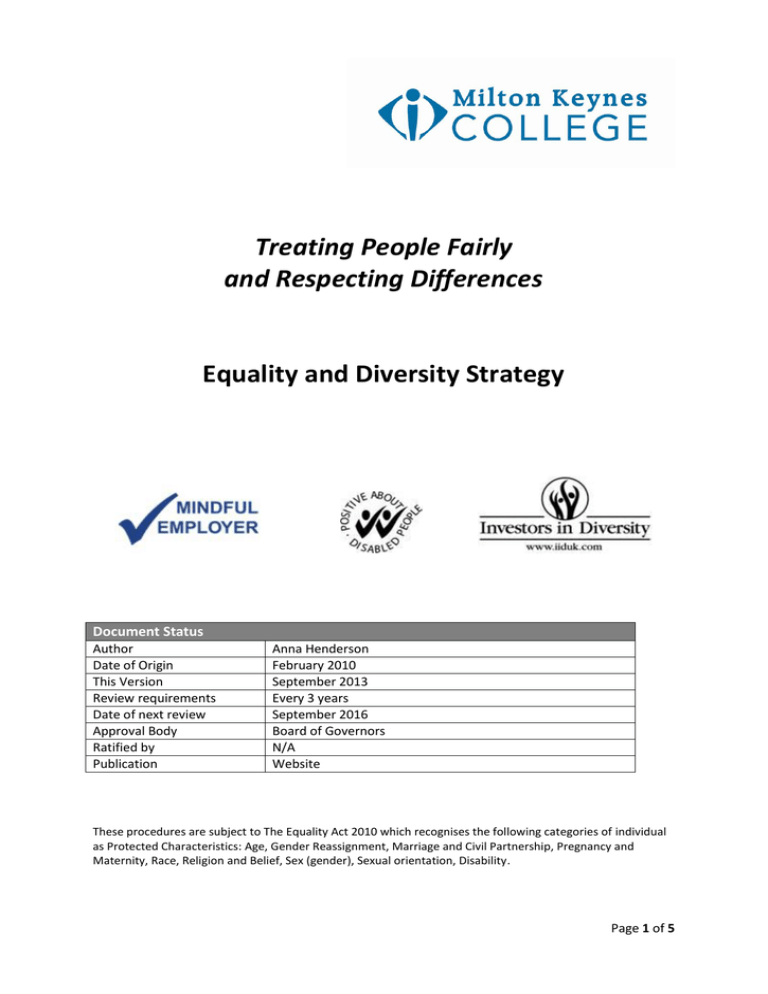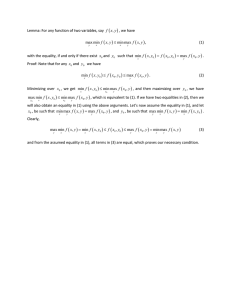Treating People Fairly and Respecting Differences Equality and
advertisement

Treating People Fairly and Respecting Differences Equality and Diversity Strategy Document Status Author Date of Origin This Version Review requirements Date of next review Approval Body Ratified by Publication Anna Henderson February 2010 September 2013 Every 3 years September 2016 Board of Governors N/A Website These procedures are subject to The Equality Act 2010 which recognises the following categories of individual as Protected Characteristics: Age, Gender Reassignment, Marriage and Civil Partnership, Pregnancy and Maternity, Race, Religion and Belief, Sex (gender), Sexual orientation, Disability. Page 1 of 5 Treating People Fairly and Respecting Differences: Equality and Diversity Strategy (1) At the Heart of our Purpose and Vision Purpose To be at the heart of our communities creating excellent learning in partnership with every area of our society and economy Vision Excellence for our learners, their communities and our business partners Equality and diversity is about treating people fairly and respecting their differences. This means that all are given an equal opportunity to succeed, whilst also recognising and celebrating our differences. Embracing and advancing equality and diversity are central to delivering the College’s values, ensuring that we meet the needs of our diverse community, and that all staff and potential students are supported and inspired to achieve their very best. This ethos is not limited to College premises: we are proud of the leading role we take on our community, both locally and nationally, to promote equality and diversity, and will continue to fulfil our civic responsibility with pride. The College will ensure that no individual is disadvantaged because of a protected characteristic, as defined by the Equality Act 2010: age, disability, gender reassignment, marriage and civil partnership, pregnancy and maternity, race, religion and belief, sex and sexual orientation. Treating people fairly and respecting their differences is not merely a box-ticking exercise. In addition to recognising the protected characteristics as described in law, the College will identify and support the needs of the individual, needs which may have nothing to do with a protected characteristic, such as having limited money, being long term unemployed or an ex-offender. In short, this means opening up education – or a career in education – to as many as possible and encouraging them to succeed. The College’s strong work in advancing equality and diversity was highlighted in June 2012, with the award of the ‘Two Ticks’ kitemark for the fourth consecutive year, in July 2012 with the successful re-accreditation of the Investors in Diversity Award, and in December 2012 with two awards at the MK Equality Council’s Diamond Jubilee Awards. The College will seek to continue to have its efforts recognised externally. Page 2 of 5 (2) Central to our Values Equality and diversity underpin the College’s values. To inspire: where everyone motivates, engages, challenges and stretches each other The College will inspire individuals to succeed, in spite of previous barriers, such as encouraging females in the construction industry, males in childcare, and students from Black and Minority Ethnic backgrounds into apprenticeships. To strive for excellence: where everyone recognises their own potential and becomes the very best they can be We will acknowledge the potential of individuals and seek all to excel, challenging preconceived expectations. To show respect: where we listen, consider the views of everyone and value everyone Perhaps the value with the most explicit link to equality and diversity, ‘respect’ is about continuing to foster a culture where individuals are valued and our differences and achievements are celebrated. To innovate: where new ideas and thinking are generated around people, products and processes A diverse workforce, student population and partnerships provide an exciting hub of new ideas, and the College will seek to maximise the creativity and innovation abundant amongst such a wide group of individuals. To demonstrate integrity: where everyone is committed to being open, honest and doing the right thing Acting with integrity requires all at the College to always seek to do the right thing, living by these values and treating individuals with decency and respect. (3) Working in Partnership and Serving our Community The recent history of Milton Keynes is one of migration of individuals and families from across the country and, indeed, globe. The city has proven itself to be a dynamic, innovative and inclusive place. The population is becoming increasingly diverse, with the Black, Asian and Minority Ethnic (BAME) population now amounting to nearly 20% of the total citizenry. Educational achievement and economic prosperity is mixed in the city. Skill levels are at or around the national averages, including those holding five or more GCSEs at A* to C grades, with great capacity to expand the provision of higher level skills. Levels of child poverty are above the regional average – 20.6% compared with the south east’s 15.4% – but are slightly lower than the national average of 21.3%. The city contains seven Lower Layer Super Output Areas (LSOAs) which are in the country’s 10% most deprived areas; 24 LSOAs are amongst the country’s 30% most deprived areas. Page 3 of 5 Our community is not confined to the immediate area of Milton Keynes, with well-established links across the south east and east midlands, and the College’s Offender Learning provision affording us influence at a national level. The College prides itself in taking a central role in the development of its local and national community, and will continue to serve the whole population and not just part. As well as ensuring that Milton Keynes College is an outstanding employer and education provider, we will work with our partners to encourage social cohesion and economic prosperity within the community. (4) Delivering the Strategy The principals outlined in this strategy underpin the College’s overarching strategic priorities: A. To build our skills’ leadership and delivery to drive economic growth, sustainable prosperity and wellbeing B. To create an ambitious, successful and accessible learning platform C. To establish distinctive learning partnerships that drive student success and the best student experience D. To develop our own challenging measures of success informed by the aspirations of all our key partners E. To build organisational resilience and financial viability by enhancing the effectiveness of our systems, processes and structures In addition to the success measures outlined in the organisation’s overarching strategic plan, by 2017 the College will: Ensure no barriers to the College’s provision exist, with a student population representative of our local communities Recruit and retain the excellent teachers and professional business partners, with a staff population representative of our local communities Enable 90% of our students to succeed in their qualification, with a variance of no greater than 0.5% success for any groups of students Develop new impact measures for work in our communities Be regularly recognised by Investors in Diversity and similar bodies for our commitment to equality and diversity. The strategic priorities will inform an annual action plan, which will be made available on the College’s website. The College has a well-defined structure for involving students and staff in the monitoring of progress against the strategic priorities. Page 4 of 5 Student Councils and Union Equality and diversity form regular discussion items at regular Student Council meetings, formed by course representatives from across the College. The Student Union also has equality and diversity at its heart, with the following roles helping to form its Executive: Equalities Officer; Black, Asian and Minority Ethnic (BAME) Officer; and Lesbian, Gay, Bisexual and Transgender (LGBT) Officer. The Foundation Learning Student Council, designed for students who might feel less confident in raising issues with the larger Council, continues to discuss issues of access and fairness, and all groups will acts of important groups with which the College will consult and work to develop services for students. Equalities Good Practice Group (EGPG) EGPG comprises staff representatives from across the College’s faculties and business partnerships, meeting on a half-termly basis to share best practice, discuss recent developments and monitor progress against the College’s equality and diversity-related actions. Representatives also act as champions for equality and diversity in their respective areas. Equalities Strategic Review Group (ERSG) Findings from the Good Practice Group inform the termly Strategic Review Group. Chaired by the Principal and comprising senior leaders from across the organisation, including OLASS colleagues, ESRG monitors progress against the strategic objectives relating to equality and diversity. Board of Governors The College’s governing body receives an annual report on equality and diversity, ensuring the organisation meets both its own strategic objectives and its public sector duties. Page 5 of 5

